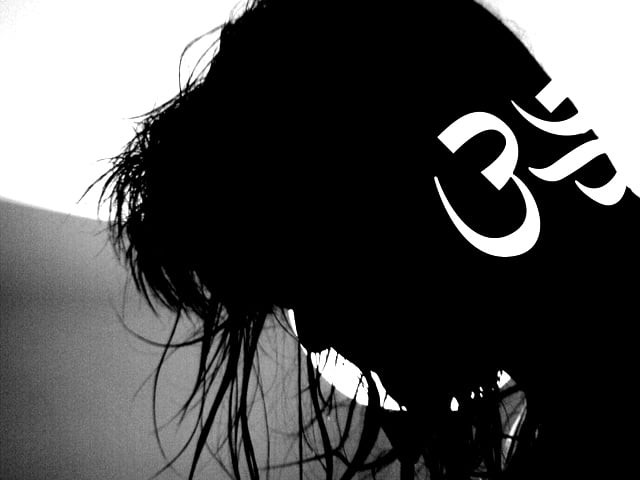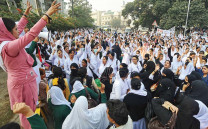Five months on, bill against forced conversion gathers dust
Sindh Assembly passed bill in November but caved in to religious parties’ protests

Many religious parties took to the streets against the proposed forced conversion law and announced a movement against it. DESIGN: JAHANZAIB HAQUE
The forced conversion bill, officially known as the 'Criminal Law (Protection of Minorities) Bill' was passed unanimously in November last year, following numerous complaints that people, especially children, belonging to non-Muslim communities, were being forced to convert to Islam. However, the situation took an unpleasant turn when many religious parties took to the streets against the proposed law and announced a movement against it.
Maintaining its tradition of bowing down to pressure of religious parties, the leadership of the ruling Pakistan Peoples Party (PPP) - which had distributed sweets while calling the passing of the bill a 'landmark achievement' - surrendered before the Jamaat-e-Islami when its chief, Sirajul Haq, called PPP co-Chairperson Asif Ali Zardari. Minutes after his call, the PPP-led government announced making amendments to the law, conveying a message to the then governor, Justice (retd) Saeeduzaman Siddiqui, not to ratify the bill.
Forced conversion is a crime, says PM Nawaz
"The governor did not sign the bill," Sindh Assembly Secretary GM Umer Farooq told The Express Tribune. "He returned it to the assembly in January this year with a message to reconsider the legislation."
According to the secretary, the governor referred to the letters written by the Council of Islamic Ideology, which had said that the bill be withdrawn or amendments be proposed to it. Meanwhile, Muttahida Qaumi Movement (MQM) Parliamentary Leader Sardar Ahmed and his party supported the law at the time of passing the bill. However, Ahmed later wrote to the governor that it was passed in haste and requested that the bill be returned to the assembly for reconsideration.
He said that a bill can only be become a law when the governor signs it or the assembly gives it a second nod. When asked about any update in the law, he said, "I don't know the mover of this bill. The government can tell you better about their intention. So far, the bill is still pending in our secretariat."
Sindh urged to ensure end to forced conversions
According to the rules, if the governor refuses to ratify any legislation, the bill is again presented in the House, which can make a final decision. This has yet to happen.
Sindh's was the first assembly of Pakistan that passed this law amid applause from civil society and human rights organisations. The private bill was moved by Pakistan Muslim League - Functional (PML-F) parliamentary leader Nand Kumar after months' long deliberations on the part of the standing committee on minority affairs. The law not only proposed to stop forced conversion of religion, it recommended that change of religion not be recognised until or unless a person becomes 18 years old.
"Mostly minor girls of the Hindu community are forced to change their religion," said Kumar. "We can present dozens of such cases that happened in Ghotki, Jacobabad, Badin, Thar, Sanghar, Mirpurkhas and other areas of Sindh."
What counter-narrative? Ulema already rejected extremist narrative, says Fazl
He added that after conversion of religion, these women or minor girls are forced by influential men or petty thugs to get married. "How can a minor girl, nine years of age, make a decision about her own will?" asked Kumar. "We have put this condition in the law so that forcible marriages of minors can be discouraged." He added that he has been repeatedly requesting the Sindh government ministers to initiate the process on this legislation but all in vain.
Condition of 18 years of age
According to sources privy to the matter, the government is considering convening a meeting with different stakeholders on the issue. "The Council of Islamic Ideology and other religious leaders have proposed the Sindh government remove the 18 years old condition for conversion of religion," a senior official in the Sindh Assembly said, adding that the reference of Hazrat Ali (AS) is given, who was a minor when he accepted Islam.
"They have asked us to remove another clause, which allows a victim of forced conversion 21 days to make an independent decision regarding conversion to a new religion before initiating a case under this act," sources said, adding that the PPP has agreed to these conditions and might make amendments to it. Despite many attempts, contact with the Sindh parliamentary minister, Nisar Khuhro, could not be established. However, newly appointed Law Minister Ziaul Hasan Lanjar said the decision is pending and the issue will be resolved soon.
Rejoinder: Indian minorities
Ramesh Kumar Vankwani, who heads the Pakistan Hindu Council, said that they would have no objection if anyone converts to any other religion of their own free will. But, he said, it is intolerable and a cognisable offence if anyone is forcibly converted. "How can a five-to nine-year-old Hindu girl accept Islam of her free will?" he questioned, saying that such actions are condemnable. "It will be a blunder if the PPP government, which claims to be the champion of minority rights, accepts these amendments."


















COMMENTS
Comments are moderated and generally will be posted if they are on-topic and not abusive.
For more information, please see our Comments FAQ